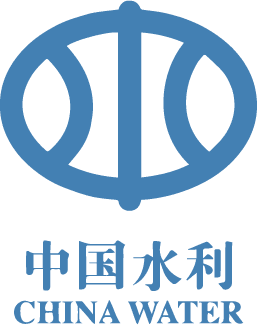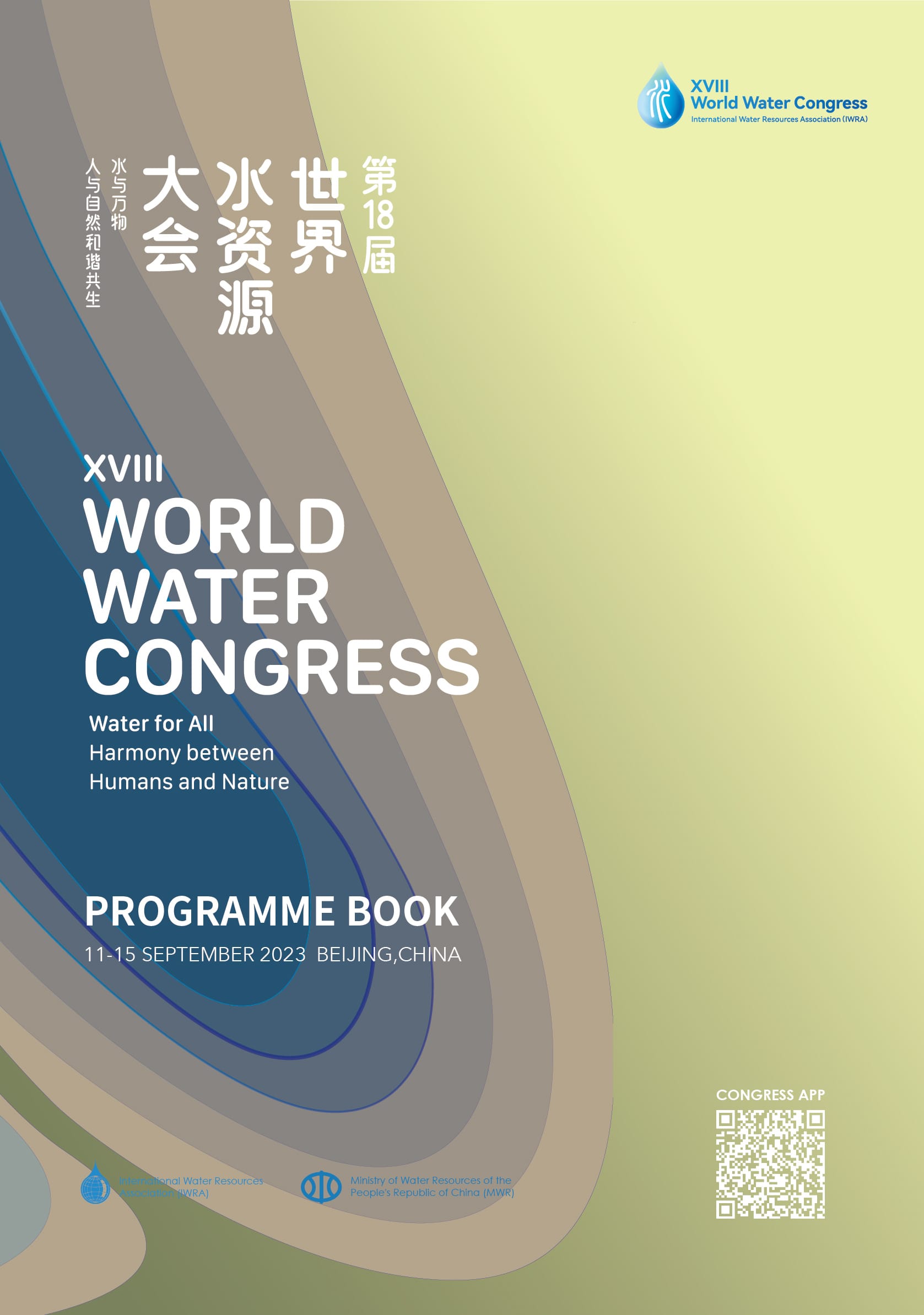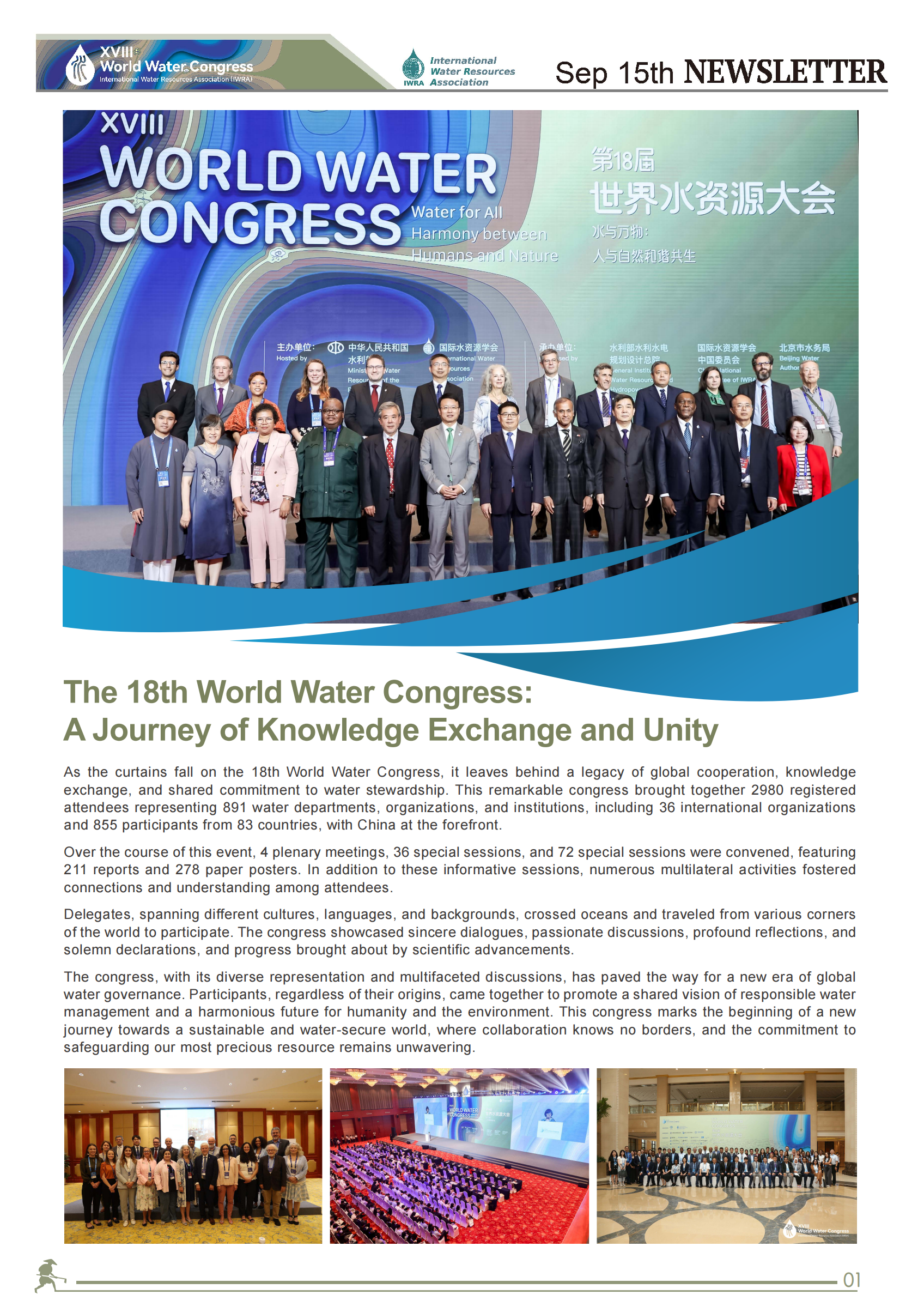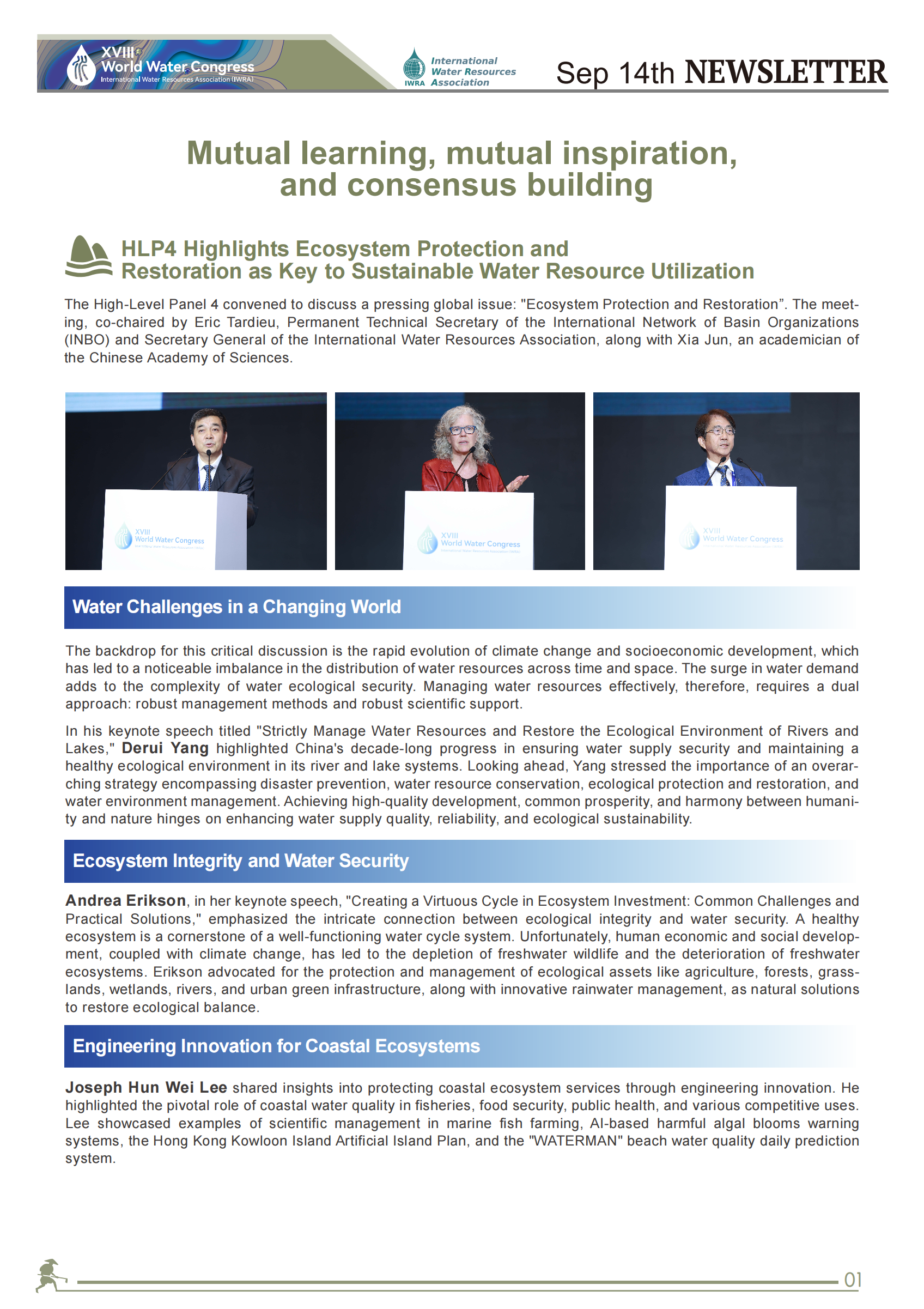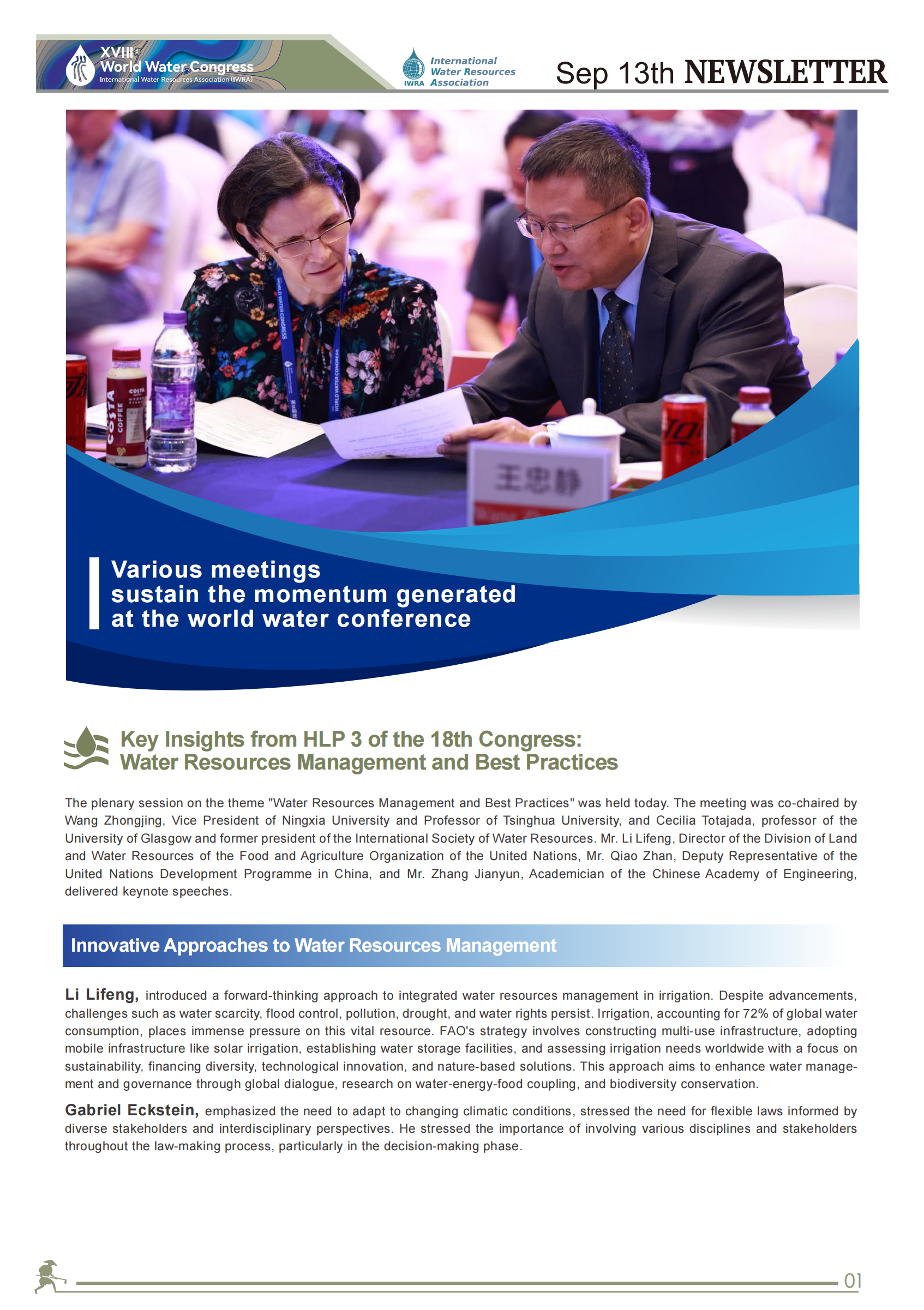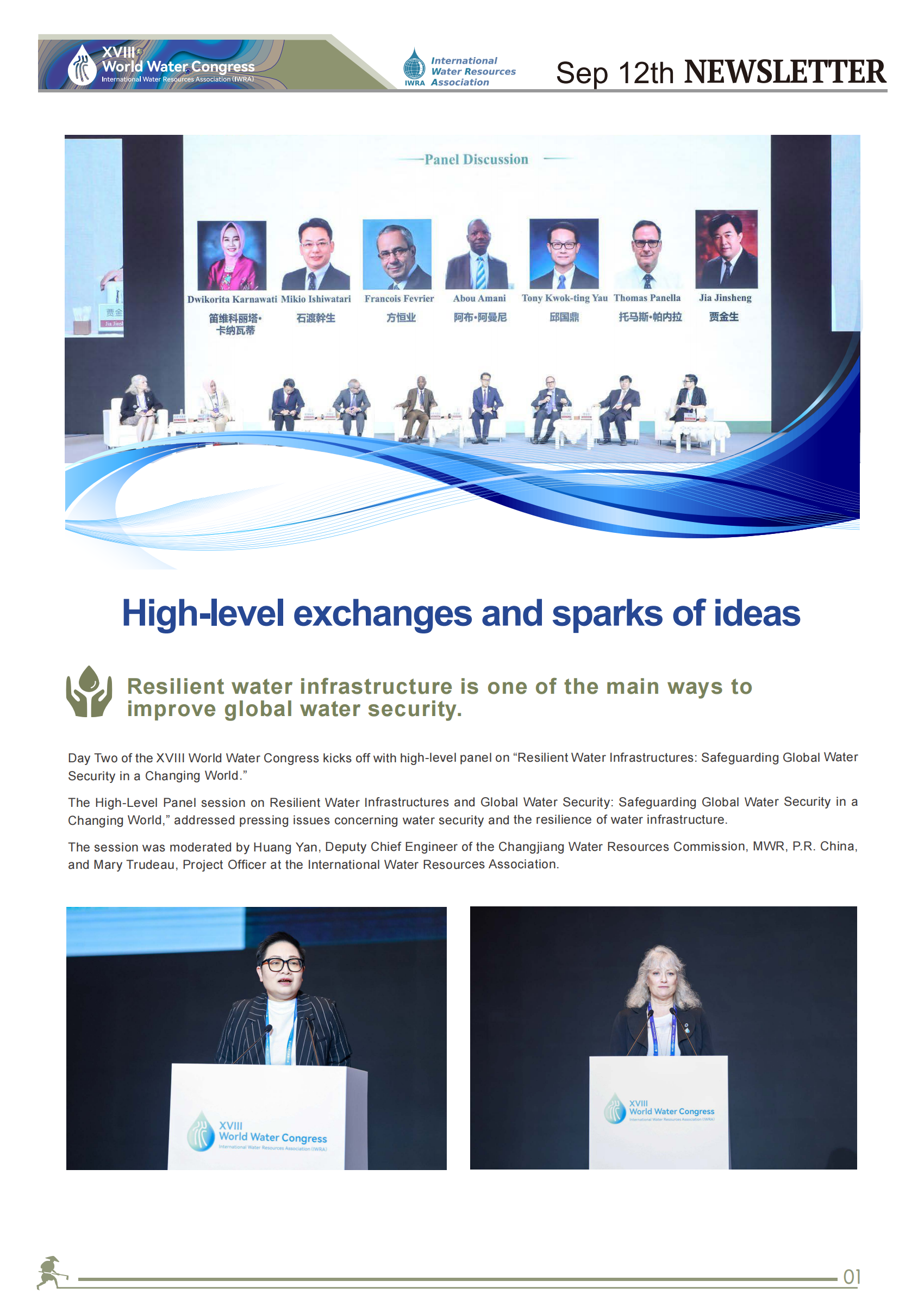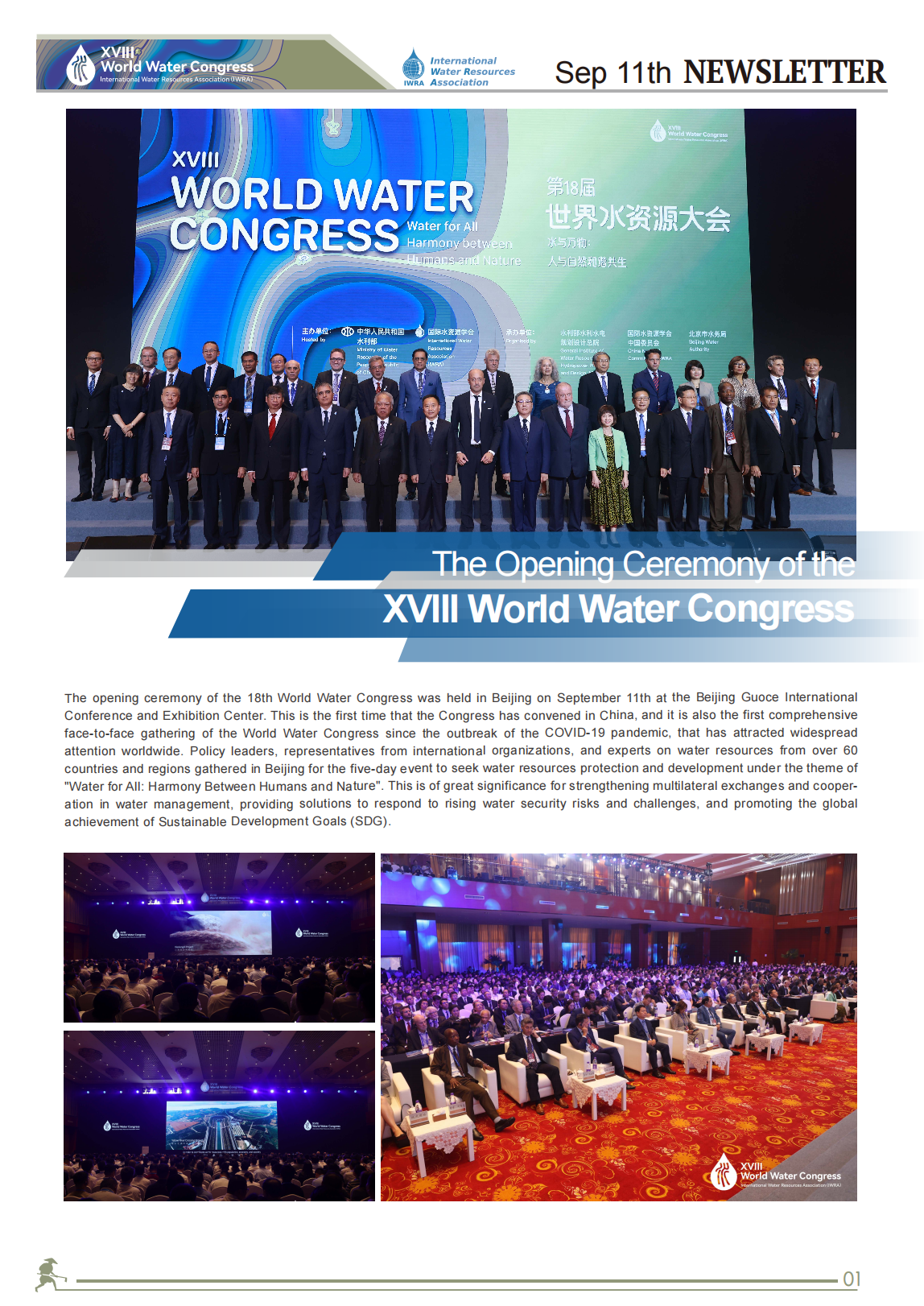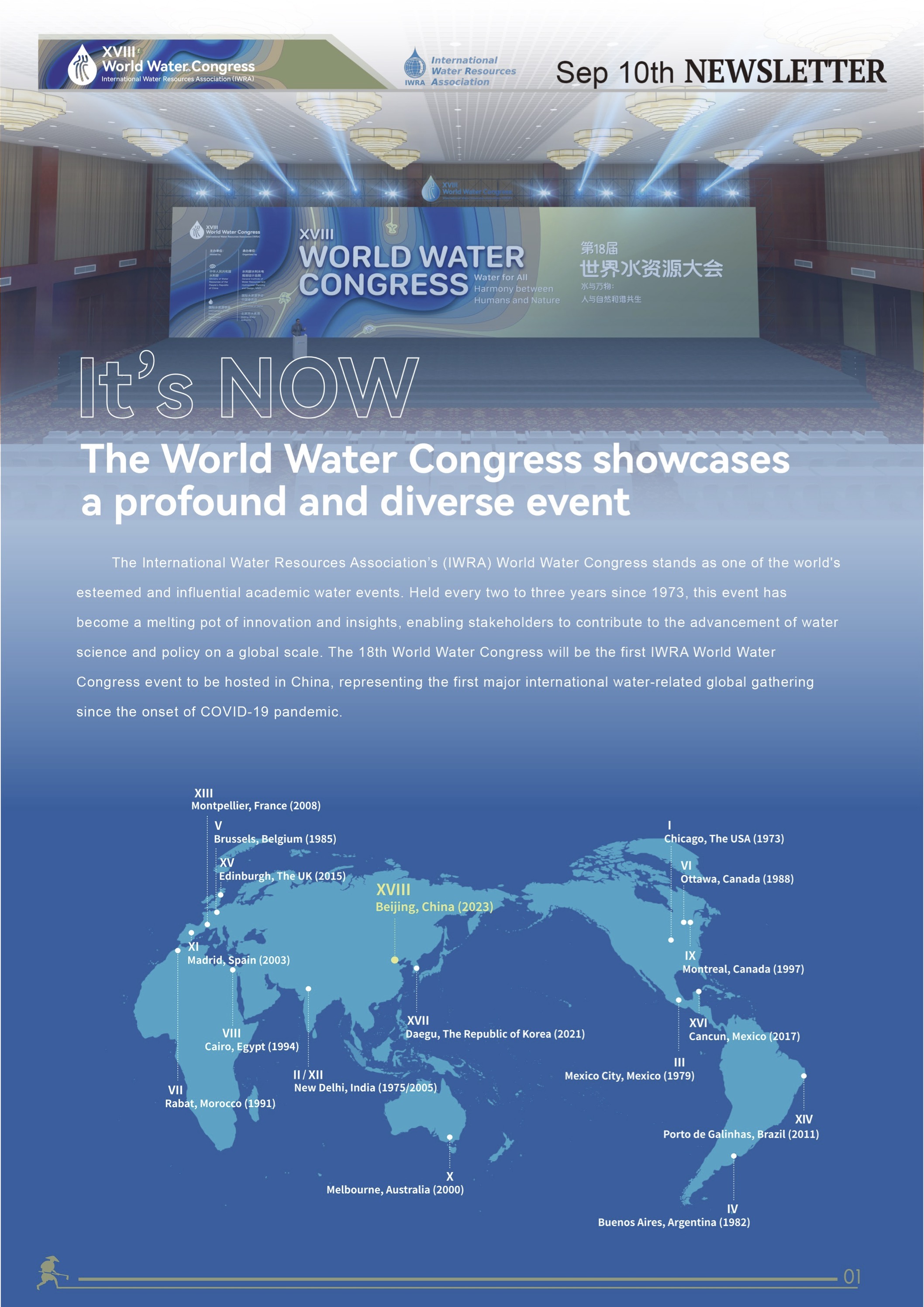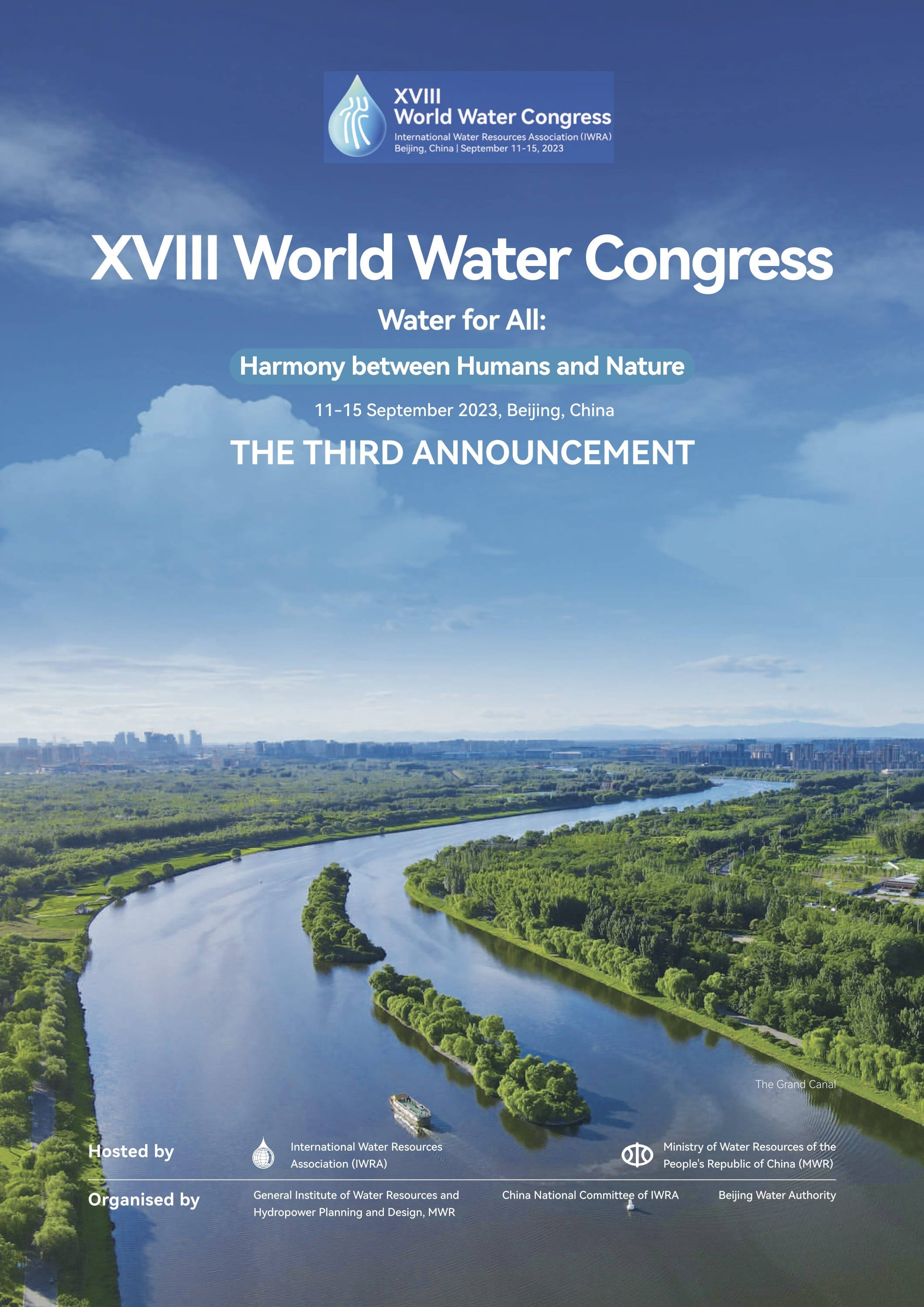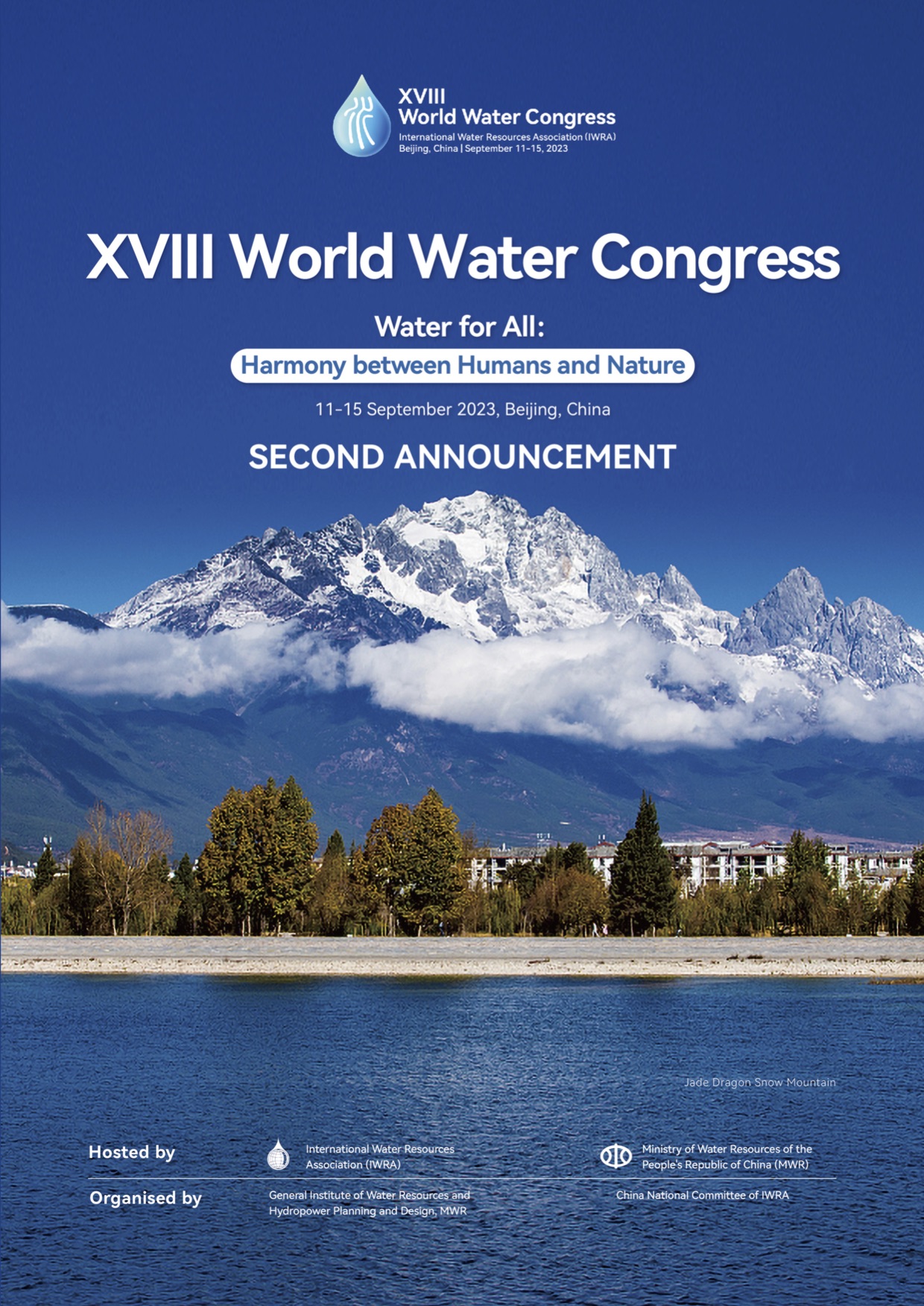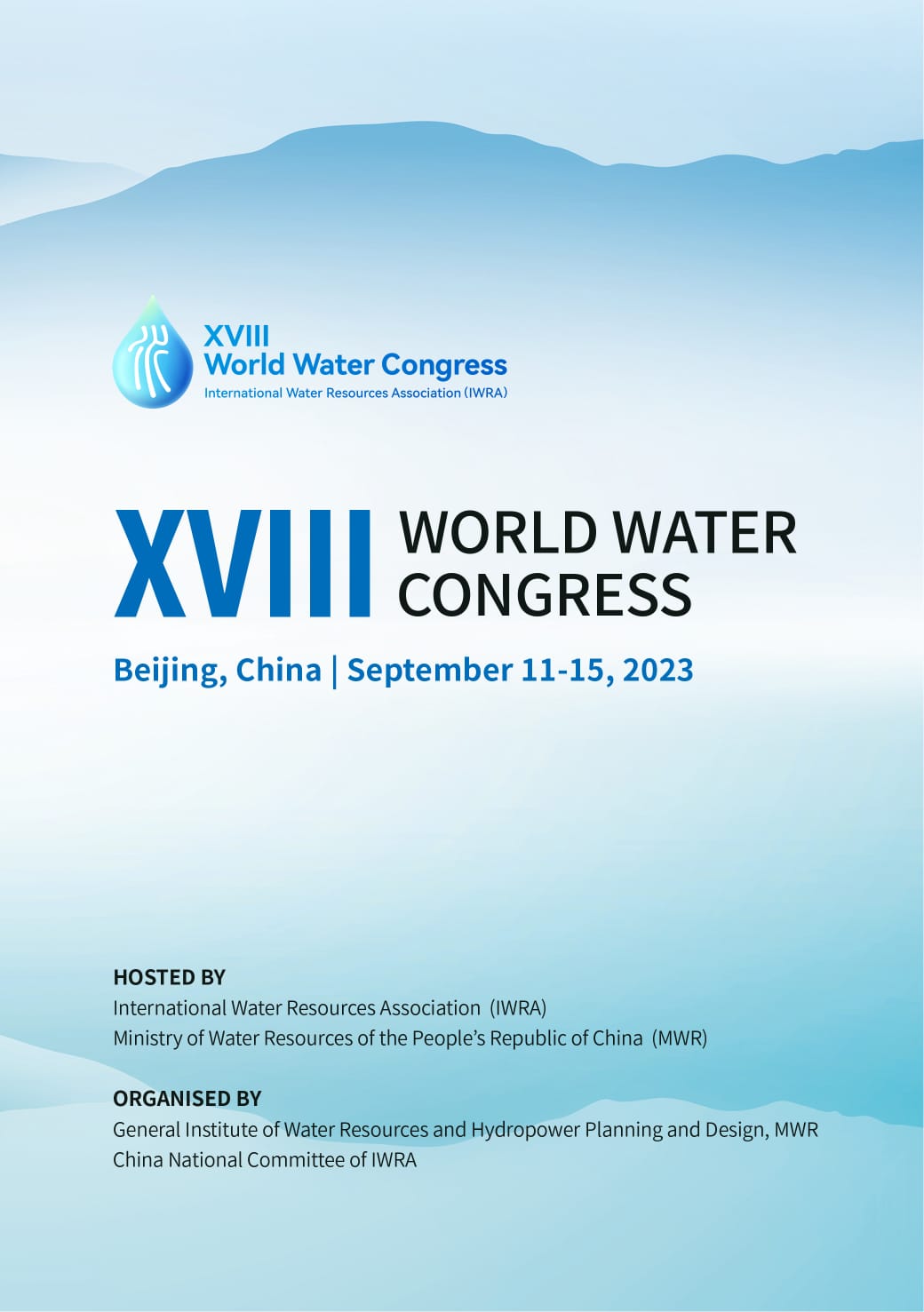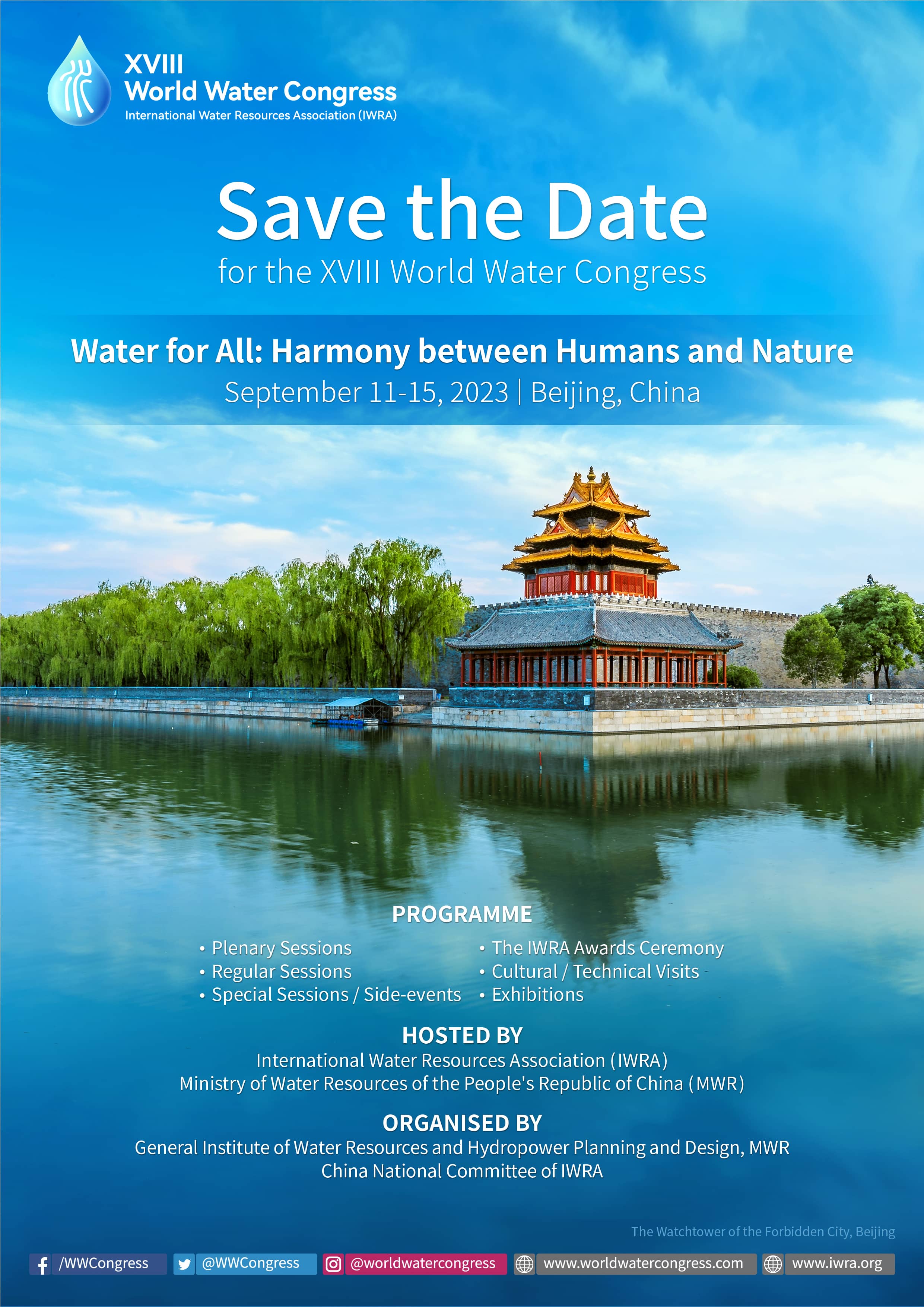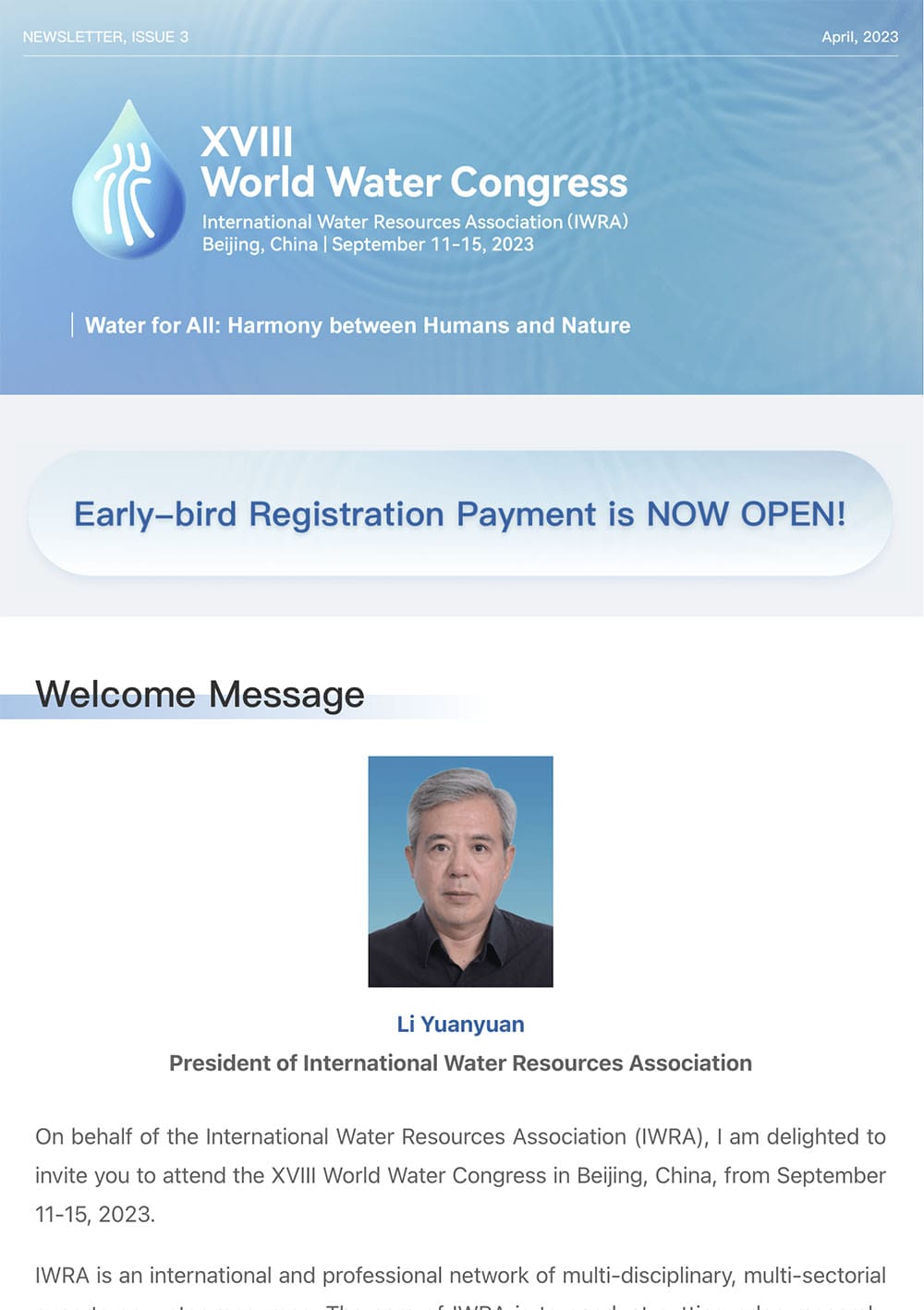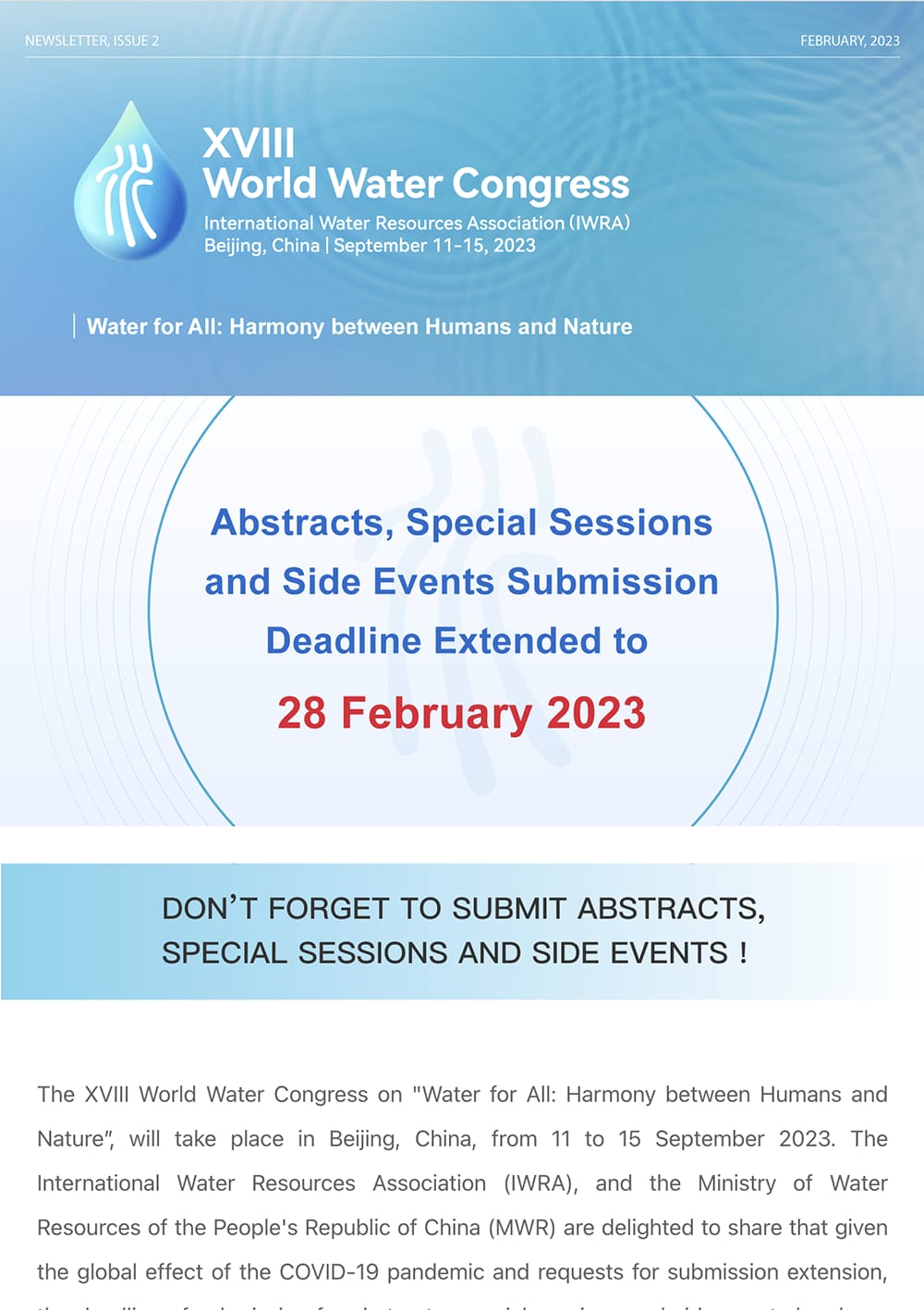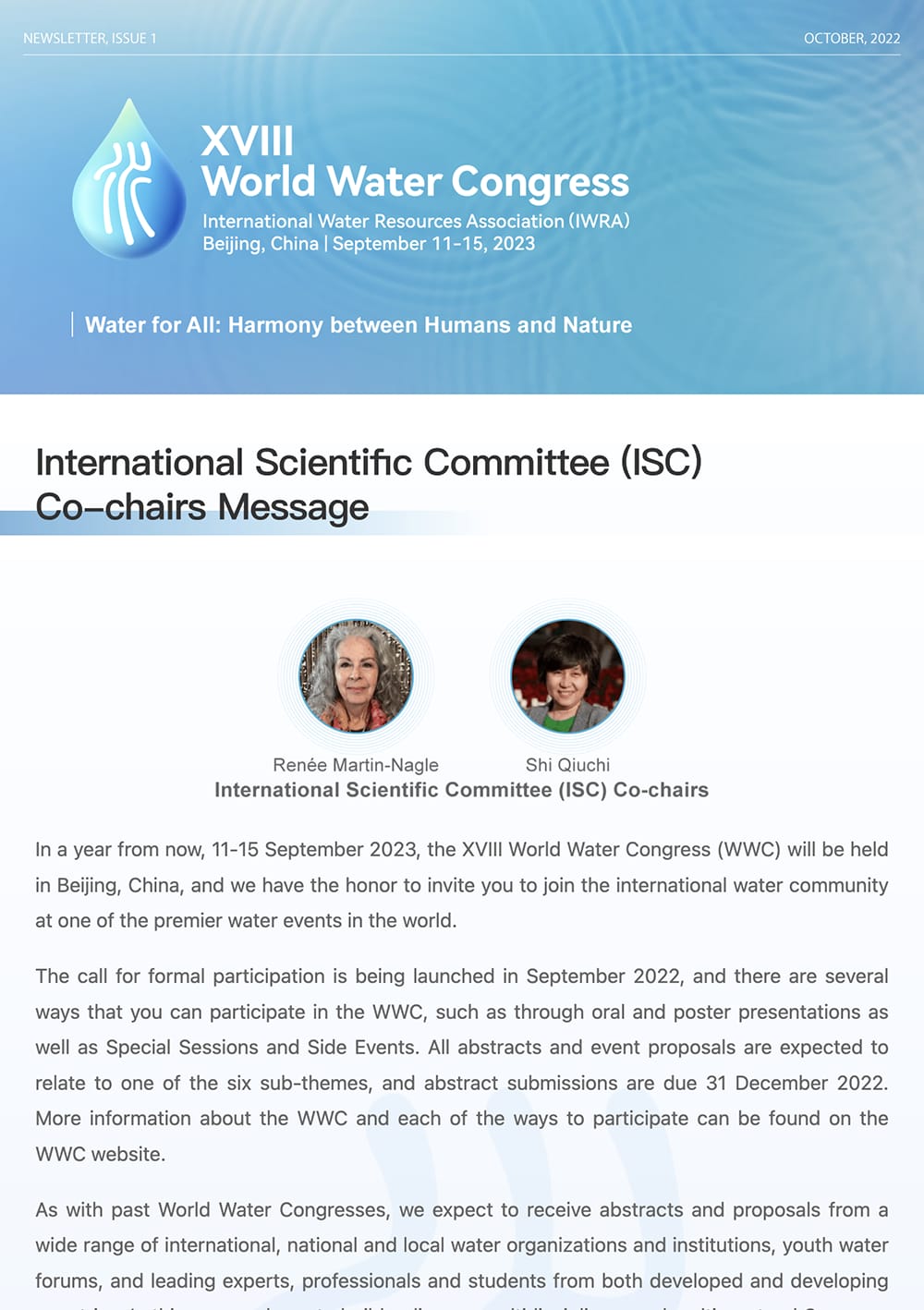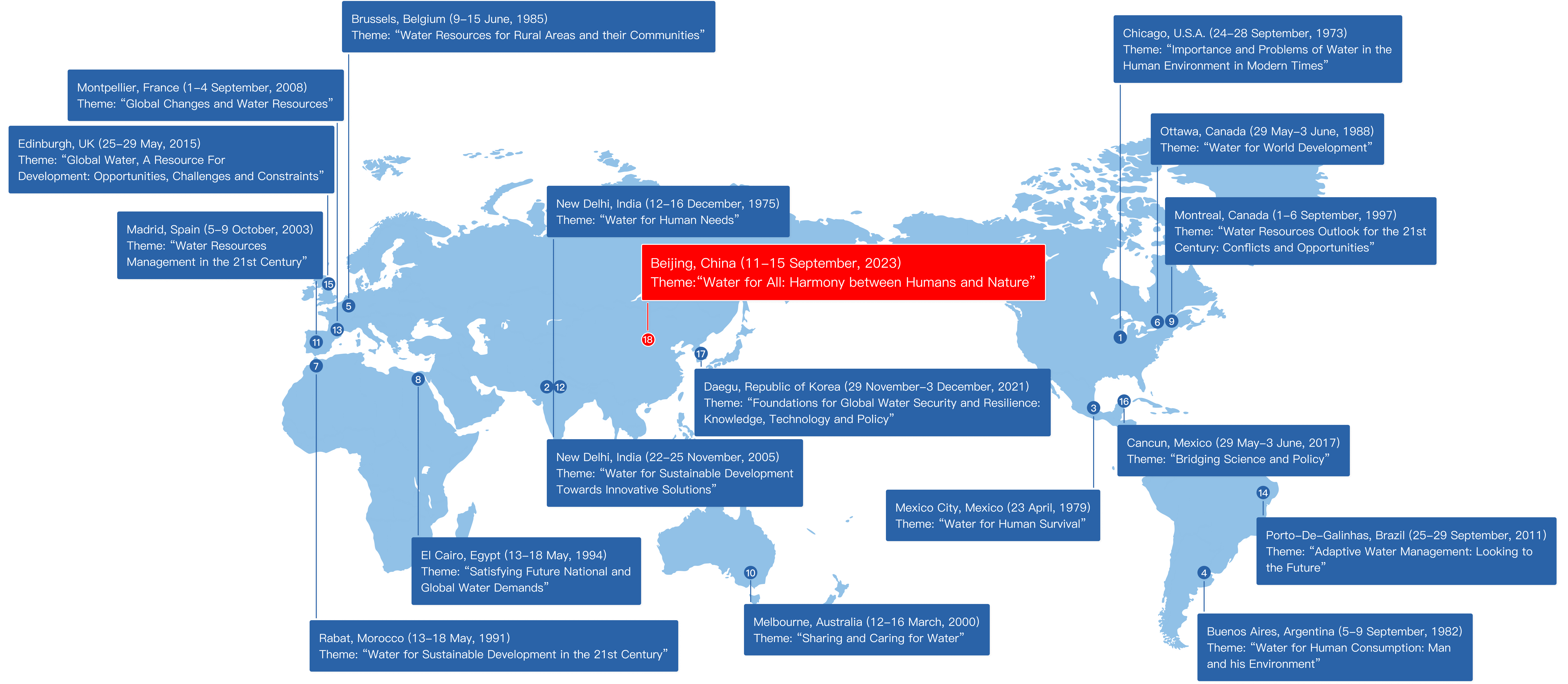Home > About Us >

Li Guoying
Ministry of Water Resources of the People's Republic of China
It gives me great honour that the XVIII World Water Congress will be held in Beijing. On behalf of the Ministry of Water Resources of the People's Republic of China, the co-host of the Congress, I wish to extend a sincere welcome to leading experts, researchers, decision-makers, and professionals from all over the world to participate in the Congress, exchanging experiences and sharing achievements regarding a wide range of topics related to water.
Water is the essence of the earth, the foundation of humanity and the source of civilisation. With rapid population growth and economic and social development, issues regarding water resources have become increasingly prominent. At present, a large population in the world lives in water-scarce areas or even has no access to clean drinking water. The increasing effects arising from global climate change and the frequent occurrence of extreme weather events such as floods, droughts, and other natural disasters have posed severe challenges to global water security. In response to these problems, the United Nations has called for global action to share advanced development concepts and technologies in the field of water resources and to take energy-saving, environmental protection, and eco-friendly comprehensive measures to achieve the water-related goals of the UN 2030 Agenda for Sustainable Development.
The Chinese nation has an outstanding heritage of water management, echoing through the 5000 years of Chinese civilisation. From the Emperor Yu's combat against the floods, the Dujiangyan Irrigation System and the Beijing-Hangzhou Grand Canal, to the Three Gorges Reservoir and the South-to-North Water Diversion Project, all of them have demonstrated the wisdom of the Chinese nation in flood control, water conservation, and utilisation from ancient to modern times. In the face of global water security challenges, China adheres to the new development philosophy of innovation, coordination, green, open, and sharing. We thoroughly implement the water governance philosophy of “prioritising water conservation, balancing spatial distribution, taking systematic approaches, and giving full play to the roles of both government and market” , and integrate this approach in the mitigation of floods and droughts disasters, optimisation of water resources allocation, protection of ecosystems and improvement of water environment. In this way, China has safeguarded the water use for nearly 20% of the world's population with 6% of the world's freshwater resources, making a great contribution to the realisation of the 2030 UN Sustainable Development Goals and the vision of jointly building a community with a shared future for mankind.
The XVIII World Water Congress is under the theme of “Water for All: Harmony between Humans and Nature” . We cordially welcome you to join us at the XVIII World Water Congress, to have dialogues on better scientific policies and solutions, and to contribute to an exciting and inspiring water event.
I look forward to seeing you in Beijing!
The World Water Congress is one of the world's largest congresses linking water policy makers, researchers and policy practitioners. Since 1973, International Water Resources Association (IWRA) has held a World Water Congress every three years in various locations around the world. This influential event has been successfully held 17 times. During the Congress, heads of international organisations, high level government officials, experts, scholars, entrepreneurs and economists from all over the world would share their knowledge, experience and practice regarding a wide range of topics related to water.
The XVIII World Water Congress will take place in Beijing, China, from 11 to 15 September 2023.
The XVIII World Water Congress will take place in Beijing, China, from 11 to 15 September 2023.
With the theme of "Water for All: Harmony between Humans and Nature", the XVIII World Water Congress aims to promote coordination and balance between the water needs of humans and nature. The Congress will facilitate knowledge and experience sharing, focusing on investigating the relationship between water, humans and nature, identifying and reconciling all water-related factors in a coordinated manner, and making and implementing water management strategies and polices using systematic approaches.
The objective of the World Water Congress is to provide a meeting place to share experiences, promote discussion, and to present new knowledge, research results and new developments in the field of water sciences around the world. For almost five decades the World Water Congresses have been excellent events for the identification of major global themes concerning the water agenda, and for the bringing together of a large cross-section of stakeholders for the development and implementation of decisions in the field of water.
Water for All: Harmony between Humans and Nature
Water is for all, including humans and nature. As a precious natural resource, water plays a vital role in meeting human needs, preserving the environment and developing our countries. Thus, water management should consider, coordinate and balance the various needs, and fundamentally achieve harmony, which embodies a dynamic, coordinated, appropriate and equitable relationship, between humans and nature.
With the theme of "Water for All: Harmony between Humans and Nature", the XVIII World Water Congress aims to promote coordination and balance between the water needs of humans and nature. The Congress will facilitate knowledge and experience sharing, focusing on investigating the relationship between water, humans and nature, identifying and reconciling all water-related factors in a coordinated manner, and making and implementing water management strategies and polices using systematic approaches.
-
Sub-theme 1: Water-Human-Economy(Agriculture, Industry, City...)-Ecology Nexus under a Changing Environment
Various factors impacts water security, including climate change, infectious diseases, and traditional factors (e.g. population growth, urbanization, industrialization, agricultural development, floods, droughts, pollution, groundwater over-exploitation, etc.). To ensure water security both globally and locally, it is required to coordinate multiple aspects of the water sector, as well as the relationships of water with social-economic development (human behaviors), ecological sustainability (natural dynamics with human influences) and water-food-energy nexus.
1-1: Rules and mechanisms of natural hydrological cycling and socio-economic water cycling evolution under climate change
1-2: Vulnerability and adaptability of water-land-energy-food nexus
1-3: Balanced and coordinated development of water-economy-ecology system
1-4: Water security challenges in key regions
1-5: Water security assessment and risk management
1-6: Water security, human development and economic growth linkages
1-7: Climate-induced risks in irrigation and water supply
-
Sub-theme 2: Promoting Water Efficiency, Productivity and Services
A healthy water system should reflect the true value of water to deliver services for people and the environment, such as clean and affordable water for drinking, adequate and equitable water supply for livelihoods, and prosperous ecosystems with biodiversity. Water efficiency can be promoted by proper pricing, water saving, and water reuse and recycling, integrated water management, etc.
2-1: Water supply and demand management
2-2: Water use efficiency and productivity improvement through scientific, technical, economic and educational means
2-3: Agricultural/Irrigation water and other rural water systems for livelihood improvement
2-4: Wastewater treatment and reuse
2-5: Water pricing and water rights reforms
2-6: Covid-19 and safe drinking water
2-7: Water services and water service providers
-
Sub-theme 3: Building Resilience for Disaster Prevention and Mitigation
To address the impacts of climate change and human activities, it is necessary to build resilience to enhance adaptation capacity and mitigate water-related disaster risks, such as, floods, droughts, pollution accidents, groundwater over-exploitation, and man-made events.
3-1: Prevention and mitigation of extreme weather induced water-related disasters
3-2: Development of flood control projects
3-3: Nature-based Solutions for water-related disaster prevention and mitigation
3-4: Floodwater resource management and utilization
3-5: Monitoring and early warning of water-related disasters
3-6: Improving resilience of water infrastructure projects for extreme events
3-7: Management of water risks induced by extreme weather and climate events
-
Sub-theme 4: Supporting Aquatic Ecosystem Health and Functions
An aquatic ecosystem needs adequate space, quantity, quality, and biodiversity to reach a good condition for its intrinsic functions. This needs to protect the water from the source to the estuary and requires a holistic and nature-based solution.
4-1: The ecological health of rivers and lakes
4-2: Maintenance and restoration of the river basin eco-hydrological process
4-3: Protection and management of major rivers and lakes, from headwaters to estuaries
4-4: Ecological restoration of degraded rivers and lakes
4-5: Value of aquatic ecological products/goods and services
4-6: Aquatic biodiversity protection
4-7: Groundwater and ecosystem
4-8: Water quality improvement
-
Sub-theme 5: Establishing Sustainable Water Infrastructures
Strategic approaches are needed to combine natural water systems and water infrastructure in an environment-friendly ways to secure reliable social and economic services, such as flood control, water supply for drinking/agriculture/industry, energy generation, navigation, ecosystem conservation, etc. Sustainable and smart water infrastructure aims to solve water-related issues using state-of-the-art sciences and technologies, such as cloud computing, big data, internet of things, geospatial exploration and sensing, machine learning, artificial intelligence, etc.
5-1: Exploitation and development of Nature-based Solutions in water engineering and technology
5-2: Large inter-basin water diversion projects
5-3: Digital twin river basins and digital twin projects
5-4: Intelligent business application system for water regulation and management
5-5: Joint operation and regulation of water projects
5-6: Multi-functional utilization of water projects, including hydropower stations
-
Sub-theme 6: Innovation for Water Governance and Management
This subtheme focuses on the management pillar to make what discussed in the other five subthemes realistic. Innovation of water management is a necessity to bridge gaps in the traditional management mindset. Topics include institutional system reform, water resources management, financing and marketing mechanisms, legal system building, river basin management, management innovation, and other mechanisms.
6-1: Water rights and water markets
6-2: Innovation of investment and financing mechanism, including green finance
6-3: Adaptive water management
6-4: Integrated river basin management
6-5: Information transparency and public participation
6-6: Role of Environmental, Social, Governance (ESG) initiatives and reporting
6-7: Role of national and international law
6-8: Creative technology and tools for water resources management
6-9: Water footprint analysis and its application in regional land use planning
The Ministry of Water Resources of the People's Republic of China (MWR) and the International Water Resources Association (IWRA) have set up governance and working bodies, which consist of the Congress Organising Committee (COC), National Organising Committee (NOC), International Scientific Committee (ISC), Congress Secretariat (CS) and IWRA Executive Office (EO).
Congress Organising Committee (COC)
Honorary Chair
Li Guoying Minister of Water Resources of the People's Republic of China
Chair
Wang Daoxi Vice Minister of Water Resources of the People's Republic of China
Vice Chairs
Yang Derui Director General of Water Resources Management Department, MWR, China
Xu Wenhai Director General of National Office of Water Conservation, MWR, China
Gao Minfeng Counsel of Planning and Programming Department, MWR, China; Vice President of the China National Committee of IWRA
Shen Fengsheng President of the General Institute of Water Resources and Hydropower Planning and Design, MWR, China
Li Ge Deputy Director General of International Cooperation, Science and Technology Department, MWR, China
Members
Chen Shengshui President of Nanjing Hydraulic Research Institute
Du Bingzhao Deputy Director General of Water Resources Management Department, MWR, China; Vice President of the China National Committee of IWRA
Gabriel Eckstein Past president of IWRA; Professor of Law at Texas A&M University
Loïc Fauchon President of World Water Council
Jing Maotao Deputy Counsel of River and Lake Management Department, MWR, China
Sasha Koo-Oshima Deputy Director of Land and Water Division, Food and Agriculture Organisation of the United Nations
Kuang Shangfu President of China Institute of Water Resources and Hydropower Research
Li Xiaojing Deputy Director General of Policy, Law and Regulation Department, MWR, China
Li Xiaolin Deputy Director General of General Office, MWR, China
Li Xingxue Deputy Director General of Hydrology Department, MWR, China
Li Yuanyuan Vice President of the General Institute of Water Resources and Hydropower Planning and Design, MWR, China; President of IWRA; President of the China National Committee of IWRA
Oriana Romano Head of Unit, Water Governance and Circular Economy in Cities, Urban Policies, and Sustainable Development Division, OECD Centre for Entrepreneurship, SMEs, Regions and Cities
András Szöllősi-Nagy Professor of the National University of Public Service, Budapest, Hungary
Wang Zhangli Deputy Director General of Flood and Drought Disaster Prevention Department, MWR, China
Xu Dezhi Deputy Director General of Rural Water and Hydropower Department, MWR, China
Yuan Qitian Counsel of South-to-North Water Diversion Project Management Department, MWR, China
Zhang Yunchang Counsel of Three Gorges Project Management Department, MWR, China
Zhang Fan Lead Economist and Global Lead for Water Economics and Climate Change, World Bank
Video
The XVIII World Water Congress Theme Film "Water for All: Harmony between Humans and Nature."
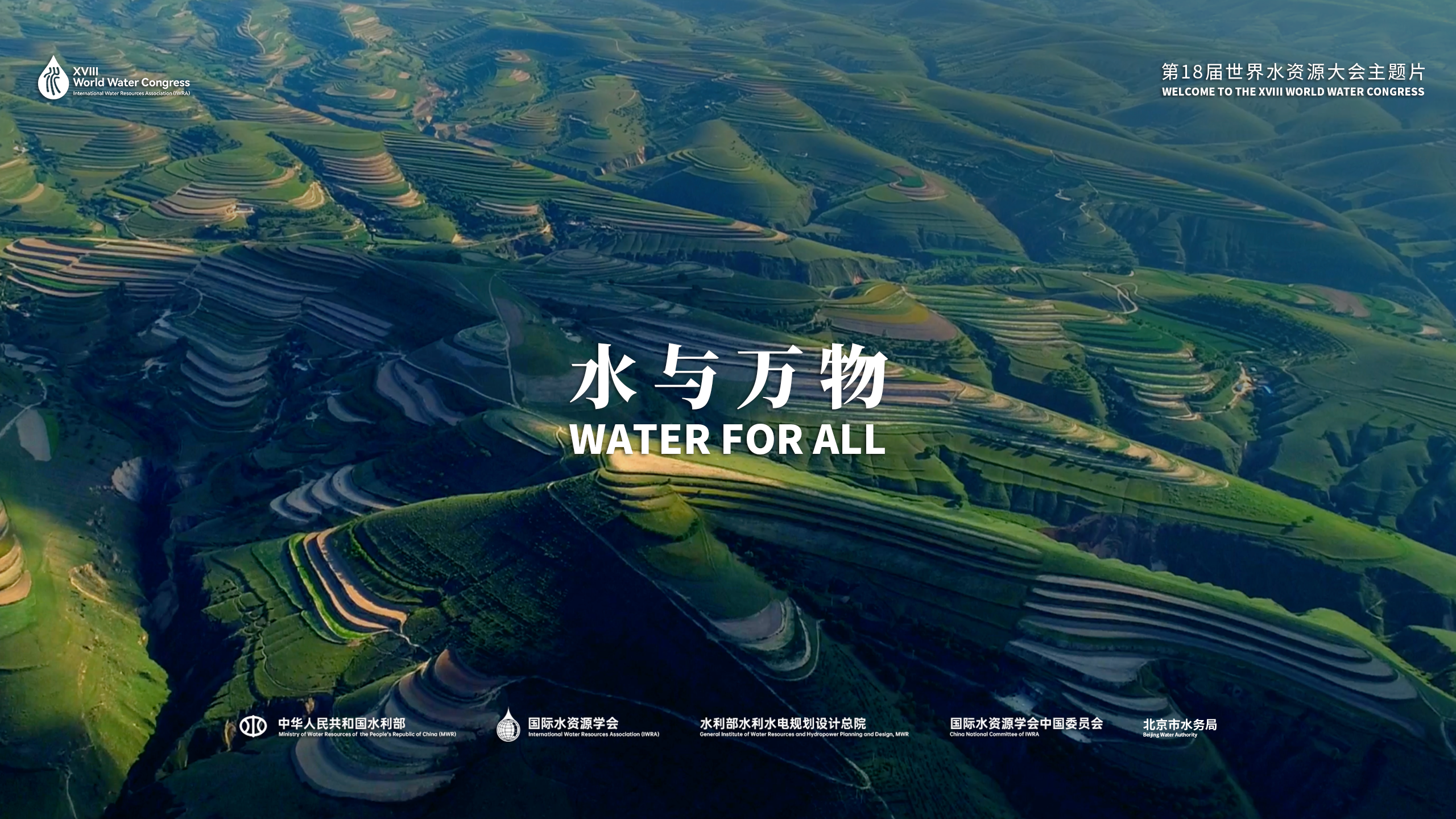
All About Water All About Us -
Invitation Film for The XVIII World Water Congress
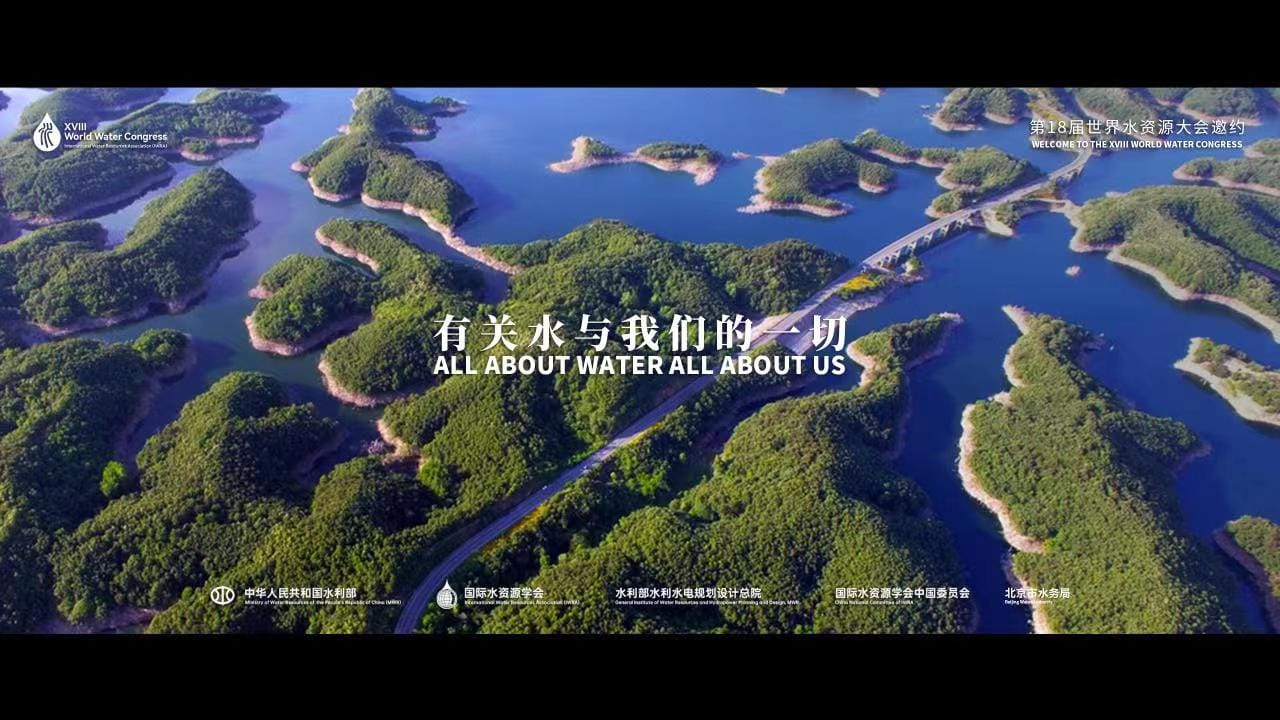
The XVIII World Water Congress Promotion Video
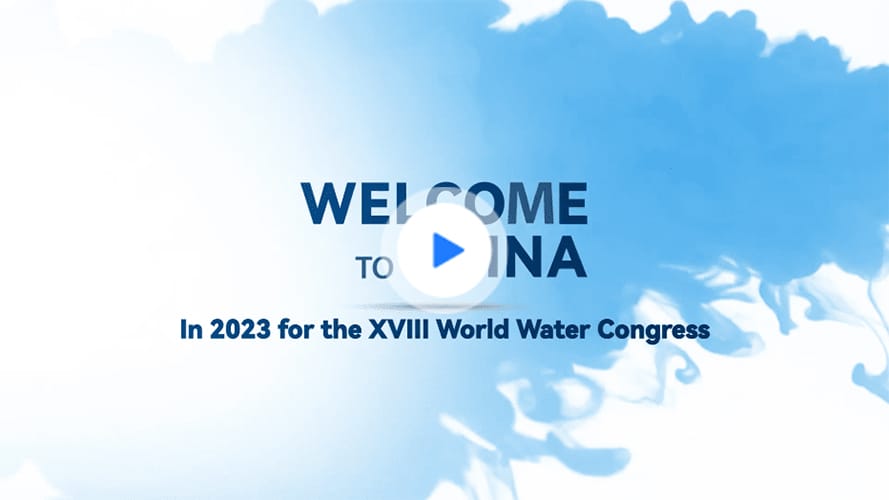
Interview Series
Interview Series – Meet Yang Derui, Director General of Water Resources Management Department, MWR, China

Interview Series – Meet IWRA President Li Yuanyuan
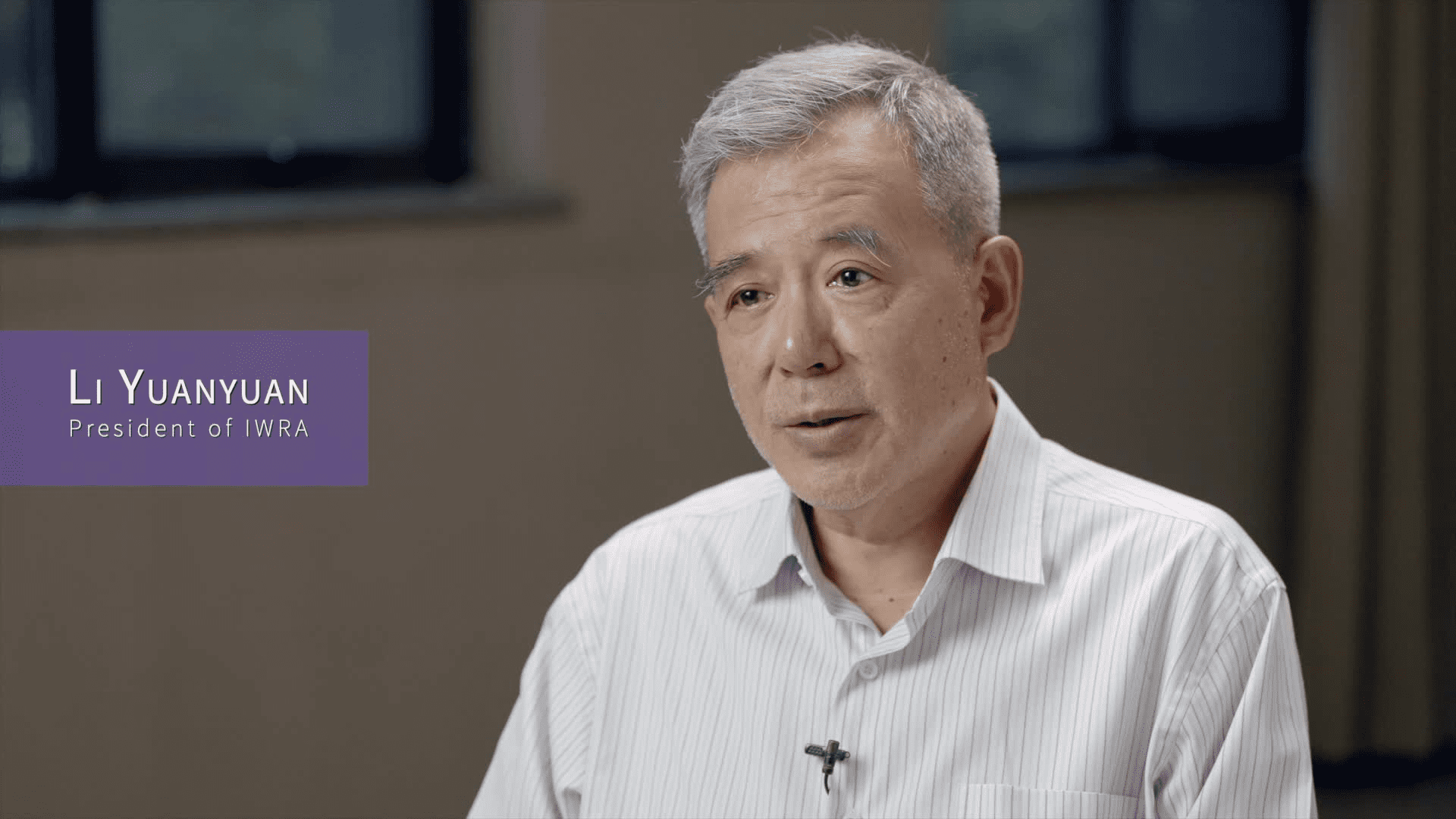
Interview Series - Meet Li Ge, Consul of the Department of International Cooperation, Science, and Technology, MWR, China

Interview Series - Meet ISC Co-chair Shi Qiuchi
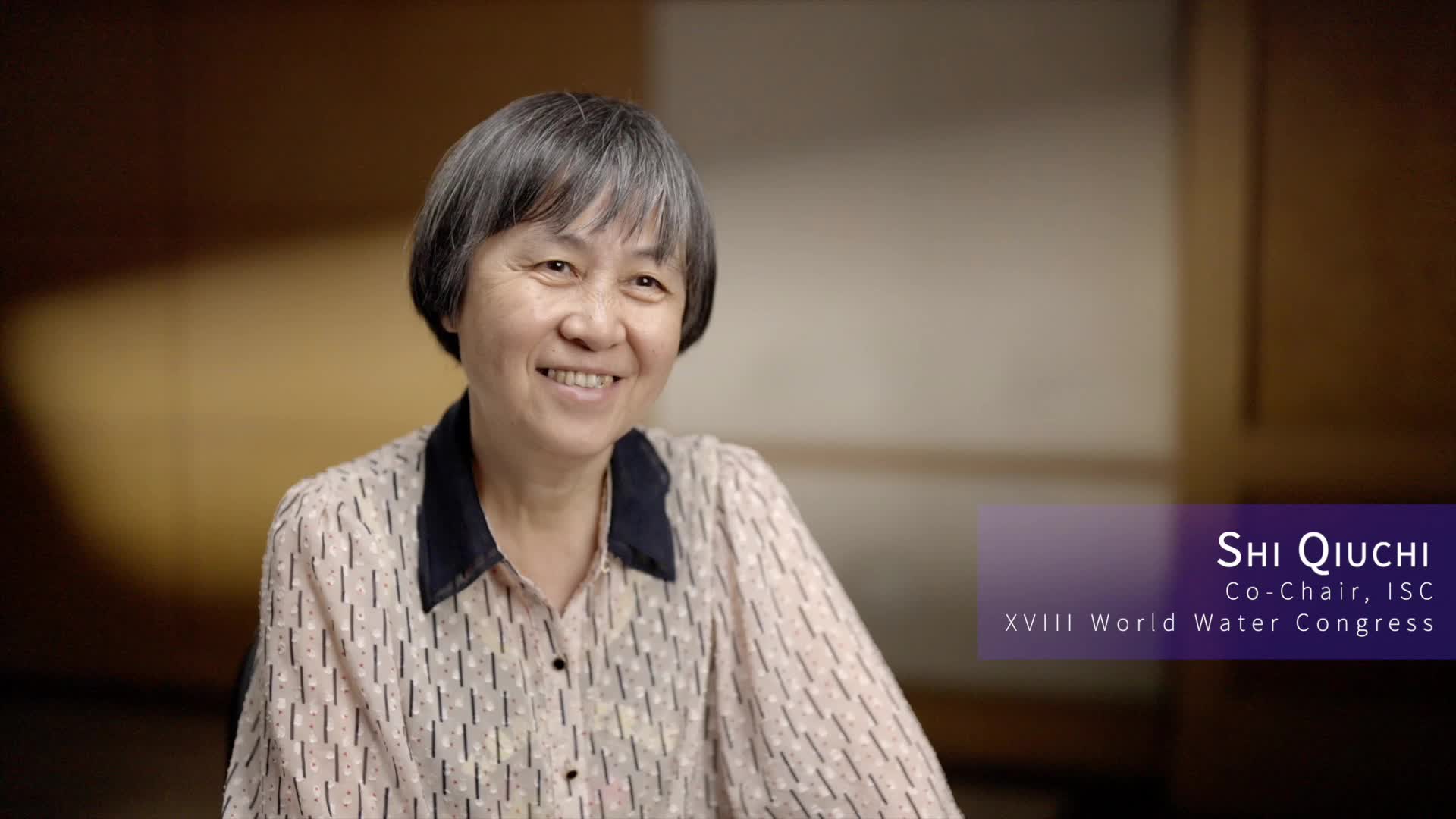
Interview Series - Meet Renée Martin-Nagle

Interview Series - Meet Callum Clench

Interview Series - Meet Kirsten Schuijt

Interview Series - Meet Prof. Wang Hao

Interview Series – Meet Benedito Braga

Interview Series – Meet Loïc Fauchon

Interview Series – Meet Gabriel Eckstein

Interview Series - Meet Prof. Xia Jun



